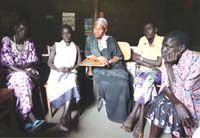Characteristics of learning
There are three key concepts that will be used to help you learn in this study session: 'learning', 'training' and 'education'. The term 'learning' refers to a process resulting in some modification, relatively permanent, of the ways of thinking, feeling, and doing of the learner. It includes both of the concepts 'education' and 'training'.

Training usually means the act of being prepared for something, of being taught or learning a particular skill and practising it until the required standard is reached.
The word education means to gain general theoretical knowledge and this may or may not involve learning how to do any specific practical work, tasks or skills. Education also refers to a process of training or receiving tuition. Usually basic training in health services is a combination of theoretical, educational and practical learning skills.
As a health professional a large part of your work will involve teaching people in your local community about health matters. This is why you need to be able to understand the key characteristics of the learning process and the learner. Although some aspects of learning really are very simple and straightforward — for example if you don't get bitten by a mosquito you won't catch malaria — other aspects of learning are more complicated. In this respect learning is considered to be unitary the learner responds as a 'whole person' in a unified way to the whole situation. They respond intellectually, emotionally, physically and spiritually at the same time.
Learning is also social, because it takes place in response to the environment in which there are other individuals as well as physical things. Each learner is unique and has needs and problems not exactly like others. In other words, some have well developed intellectual abilities and others may be less able; some are skilled in self-expression, while others have difficulty; some are slow to learn, but others may be quick; some are sociable while others are shy and retiring. An effective health educator must consider the variations and differences among learners and provide health information accordingly.
Learning is self-active this principle embodies the idea that a learner learns through their own activities. Learning is a personal process. Self-active learning includes listening, visualising, recalling, memorising, reasoning, using your judgment and thinking. In your role as a health educator you will be expected to guide, direct and select different types of learning activities based on what you want your audience to learn from your health education session. Hence, you are expected to encourage active engagement of the audience in the learning process.
Learning is purposive. That means that learning is moving toward a goal or end result. Learning experiences are meaningful when they are related to the individual's interests. It follows from this that as a health educator you are expected to involve the members of your community throughout the health education activity so that they feel ownership of the programme.

Learning is creative. For each individual, learning is not merely a summing up of previous knowledge and experience, it is a creative putting together of all the knowledge and experience of the learner.
Learning is transferable: Transferable learning means that whatever is learned in one context or situation will also apply in another context or situation. For example, the knowledge about the utilisation of some services such as antenatal care (ANC) will also be applied to the utilisation of other health services as well. This characteristic of learning strongly implies that health professionals should be very careful while passing out information since bad or inaccurate information about one issue may be transferred to other types of knowledge, and it may seriously affect the future health behaviour of individuals in your community.
In the last six paragraphs some characteristics of learning that have important implications for your health education activities have been outlined. List at least three of those characteristics of learning, making sure you are clear about what each of them imply. If you are not sure then go back and read the paragraphs again.
There are six key characteristics of learning. Learning is:
- unitary
- individual
- social
- self-active
- purposive
- creative
- transferable.
Most of these terms are self-explanatory; however, make a point of being sure you are clear what 'unitary' means as it is an overarching idea, with most of the other characteristics actually being under its 'umbrella'.